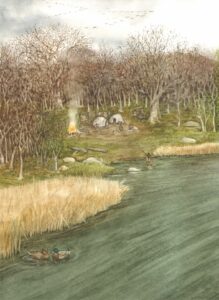
Hindsight, we are told, is a wonderful thing. In many ways, it is. But in some ways, it can hinder our view of the world.
Over the past few years, I have been part of a team researching the changing landscape of Orkney, in particular in relation to change that is driven by the rising relative sea-levels around the islands throughout the Early Holocene. In addition to the physical changes in the world around the early communities of Orkney, I am interested in the mental challenges for the people themselves. How did people make sense of the dynamic world in which they found themselves?
It has gradually become apparent to me that our interpretation of the impact of this change on those who made Orkney their home is greatly influenced by our own experience of climate change today. Of course, this is hardly surprising. We filter everything we do and think through the mesh of familiarity. But, the people of the past did not have the benefit (or limitations) of our understanding. If we only see the past through this light, then we can never begin to approach an idea of how they might have experienced life. We have to try to push ourselves out of it.
We have been lucky enough to experience a world that has been, very generally, pretty stable for the last few centuries. Relative sea-level, in Western Europe and the Northern Hemisphere, has not changed greatly. My world view sees the physical shape of the land as, more or less, naturally immutable. Over time, I have learnt how this is not the case: that mountains grow and erode, rivers wander, coastlines recede or approach – but I do not expect to experience alteration at a personal level, and I do not have the sort of connection with previous generations that affords me a collective memory of this sort of dynamism. Others might.
My lifestyle also lacks flexibility. I depend on the infrastructure of tarmacadam and rail for travel, I require a house with stone or concrete foundations, my food is gathered from all corners of the world into a massive structural depot, without a constant supply of energy carefully generated and distributed it all starts to fall apart.
The idea of change to the fabric of the world is, to me, very threatening.
But things were not so for the earliest prehistoric communities to live in Orkney, Scotland, the British Isles. Change was, for them, part of life. Many experienced a degree of sea-level change that would have been, though not visible from year to year, at least memorable from generation to generation. Some might have known stories of times of unusual cold, or heat and drought. Others might have heard of great herds of animals that no longer roamed the countryside they knew and loved. The dynamic nature of the world was, for them, normal.
It was the way things were.
In relation to sea-level rise, in particular, I find this fascinating.
Those who experienced the gradually rising relative sea-levels of the Early Holocene had no idea that sea-level rise would end. That is our privilege. For them, sea-level rise was normal. Dry land decreased; water increased. It was the way of the world. How did they build that into their view of life?
Did they feel threatened? They were, certainly, more flexible and adaptable than us. Population levels were low. Did they rely on the fact that they had always been here and could move to new locations as conditions worsened. Was this part of their place in the world, part of their relationship with nature? We seem to find ourselves too frequently in opposition to nature these days: it was not always so in the past. Did they accept a degree of fatality that individual peoples might change or even disappear? Did they experience uncertainty, perhaps even anger, and articulate it into a relationship with deities or a spiritual realm as they tried to ensure the continued existence of future generations?
We will never know. And, of course, over time, different communities in different times and places will have mediated their way through the uncertainties of the world in many different ways.
What we can do is try to strip away our own relationship with the world of today and build on a framework of past particulars in order to develop our ideas of these particular aspects of the lives of those who came before. Hindsight, in this case, does not help.
You must be logged in to post a comment.